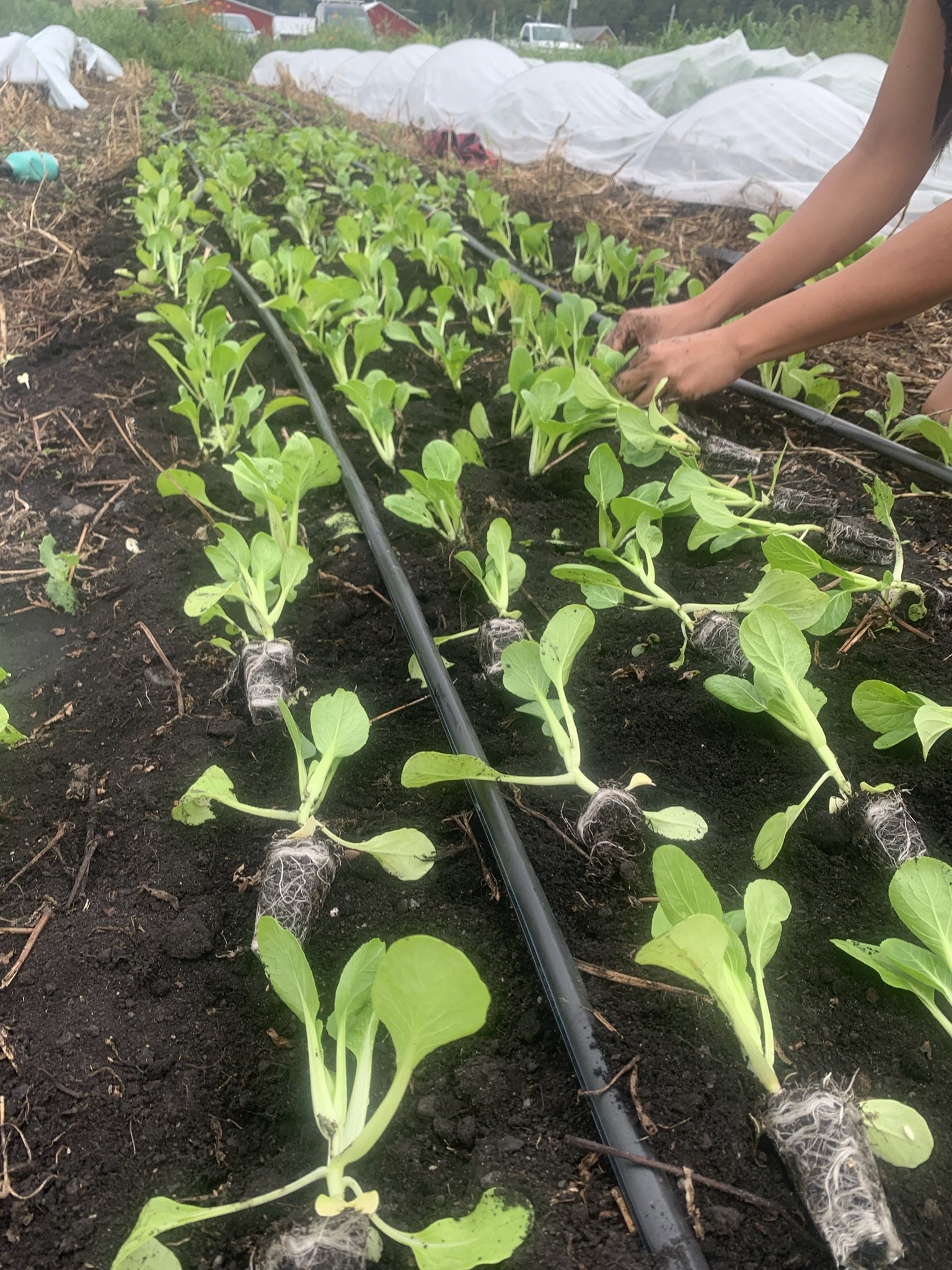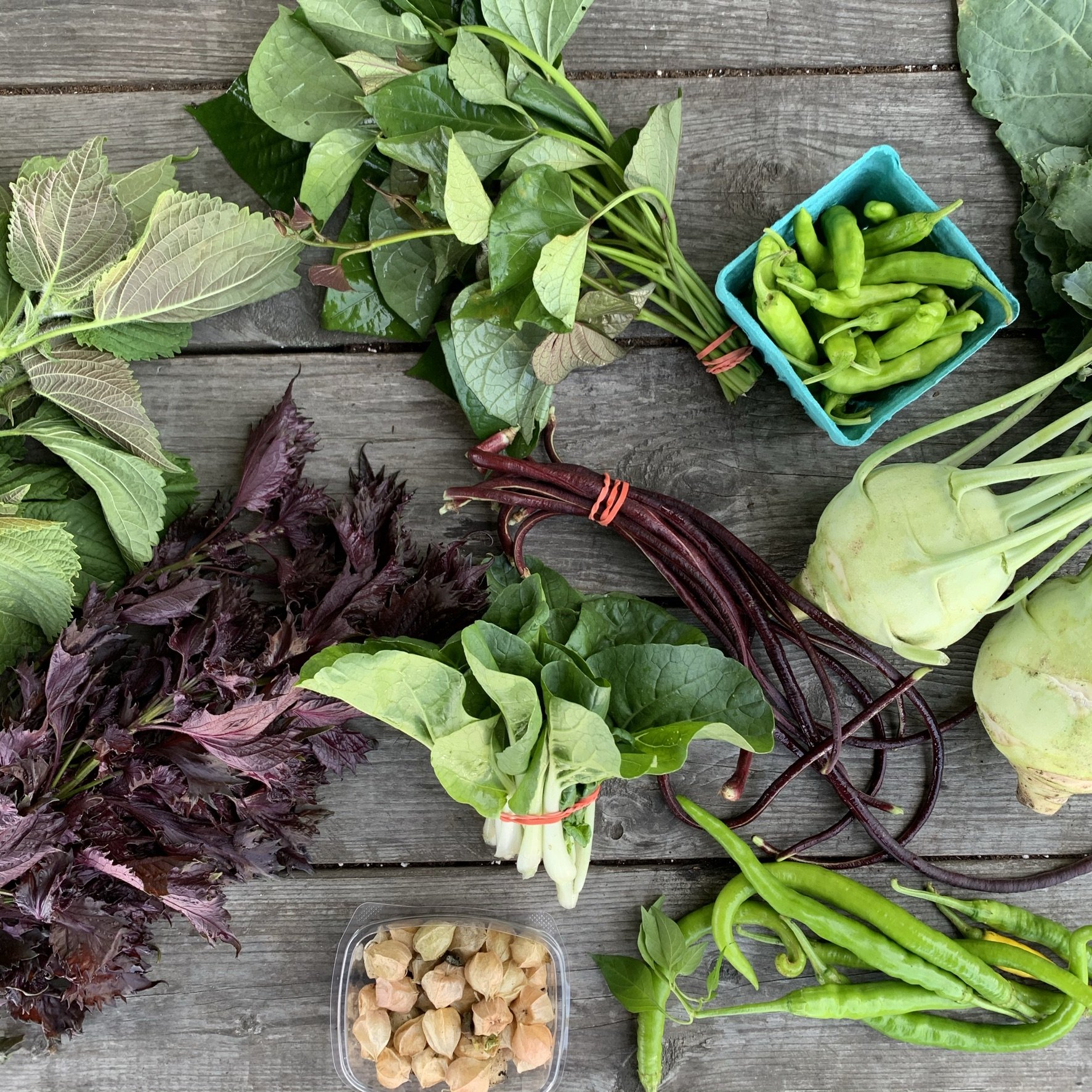Meet Christina Chan, Asian Female Farmer, Dog Mom, And Founder of Choy Division
In December Recreational Habits participated in a SoHo Holiday Pop-Up space where we threw an event to benefit Heart of Dinner, a charity organization that provides Asian elders meals throughout New York City. “Heart of Dinner exists to combat food insecurity and isolation within NYC’s elderly Asian American community. We do this by delivering care packages of hot lunches and fresh produce every Wednesday, lovingly paired with a handwritten and illustrated letter in their native language to bring warmth and comfort.” (heartofdinner.org) It was at that event that we were introduced to Christina, a young female farmer who quit academia to get her hands dirty and make a direct impact on the community by farming local and organic East Asian heritage crops, but she had never farmed until she was 25 and her journey to self-exploration and true self-acceptance wasn’t always easy. Graciously, Christina sat down to talk with Recreational Habits about her road to self-love and farming.
Being an Asian farmer ( < 1% of farms in the US), much less a female Asian farmer is rare, and for the ones that do exist their voices and stories are not amplified. It is critical to Recreational Habits and to the movement of changing perspectives to give minorities a platform to feel safe and share their lives in the hopes of broadening what is perceived as American for White Americans and the world. Move aside Old McDonald and Paul Newman, there is a new farmer feeding America, and she as dynamic as her produce. At 25, Christina had completed a degree in Environmental Science and a master’s degree in Conservation but standing at the finish line of her scholastic pursuits and looking toward the future felt grim. “I wanted to continue doing work that had a positive impact on the community and the world, not apply for grants and conduct research the rest of my career. I was searching for something that ticked my boxes in terms of getting my hands dirty, being outside, making a direct and immediate difference, while caring for our environment. That was when I started volunteering at a farm and realized that I can make a positive impact on the world by making organic produce and educating people on food, which is incredibly powerful.” Working in agriculture and connecting with the people Christina was growing for, while educating them along the way allowed her to share her knowledge to help them make informed decisions around consumption for themselves, their households and for the environment.
“Once I had gotten my bearings in the world of farming, I looked around and saw a lack of representation within the field; from who owns the farms, who is farming and what type of food is being farmed. It was always the same mainstream western vegetables; I rarely saw the vegetables that I grew up eating with my Chinese family.” The Asian community and culture heavily embrace fresh produce in their meals, so for immigrant families to not have access to local and organic Asian produce is heartbreaking, so Christina tries to, “fill the gap”. Simultaneously during the time of a pandemic and increased hate crimes towards the API community, Christina created Choy Division, ‘diversified vegetable farm, with a focus on growing East Asian heritage crops using regenerative agricultural techniques.’ (Choydivision.com) “I started small, in a backyard garden while I was living in Astoria, Queens.” The farm has now expanded to a half-acre in Hudson Valley, New York, and during the pandemic she participated in a solidarity share donation where she provided 10 weeks of 10 shares of fresh food boxes to a group of Asian elders in Brooklyn Heights. “I got to see firsthand how I could make an immediate impact on a person, on their family and on their health. Giving someone food or making someone food is giving that person life and substance. When my cup feels low or empty from doing the hard work, seeing people enjoy my food fills me right back up.”
(Momo)
Now at the age of 33, living on her farm with her Shar-Pei Pug mix dog, Momo, her childhood is behind her, but she still reflects on feeling torn between being American and Chinese. “It is something that many children of immigrants wrestle with. From the small things like spending time with your friends after school versus coming straight home, to the big things such as not being happy with the face in the mirror because I did not see my face reflected in American culture. I would think to myself, ‘Why am I like this? Why am I not the blonde girl in the commercial? Why do I have to go to Chinese school on Saturdays when my friends are all at the mall?’ It was a difficult juxtaposition to grow up in America, a progressive thinking country with Chinese immigrant parents that of course brought that culture and lens into my childhood and how they wanted to raise me. Naturally there was grist between me wanting to respect my Chinese parents and culture while still living an American lifestyle and the perceived freedoms that came with that such as going away to university, having a boyfriend, and spending time with my friends after school.” Despite all the difference in opinions in her household, the one thing that always brought her back to her roots was food and coming together to enjoy it. “Asking someone if they have eaten yet in Chinese culture is their way of expressing their affection and care for you, food is how you show love when physical affirmation is not as present. Farming feels like an extension of that to show people I care.”
“I feel very American even if white Americans do not perceive me that way, and that is a big problem. When I meet someone for the first time and they remark that my English is really good, I’m like "you can go f**k yourself". Growing up I didn’t understand the connotation that went with a question like that and once I did, it was the worst experience and continues to hurt every time it happens. So, then you overcompensate to prove that you are American but when you do that, you must give up everything else, meaning my Chinese heritage which I am proud of. No one defines your identity but you, and no matter how much you conform you can never change who you are so just be you.”
When it comes to what advice she would share with another budding farmer, it was simple. “It would be to go out and get their hands dirty. The best way to find out if farming is for you is simply to do it for a season. It is hard, hard work, and it can be tremendously rewarding, but the reality is that it can be hard on your body and mind, especially on those very hot and cold days.. Getting the experience in, whether that's volunteering at an urban farm or production farm, no matter what they're growing or raising, is the best way to get started. At the end of the day we're all doing the same work.”
You can find Christina and support her farm at ChoyDivision.Com and on Instagram @choydivision. Choy Division participates in CSA, Community Supported Agriculture where, ‘the consumer pays up front for a season's worth of produce that is distributed weekly in a box, or share, that encompasses a variety of what is in season on the farm at that moment.’ (ChoyDivision.com) What can you anticipate in your weekly box from Christina?! “Noodle beans, gai lan, husk cherries, kkaenip, Thai basil, scallions, chili peppers, chong gak radish, bok choy, winter squash, and bitter melon as well as a few mainstream vegetables like tomatoes, spinach, and potatoes that are common parts of the Asian diet.”
If you are in the New York area, we highly encourage you to explore the CSA program at Choy Division.






